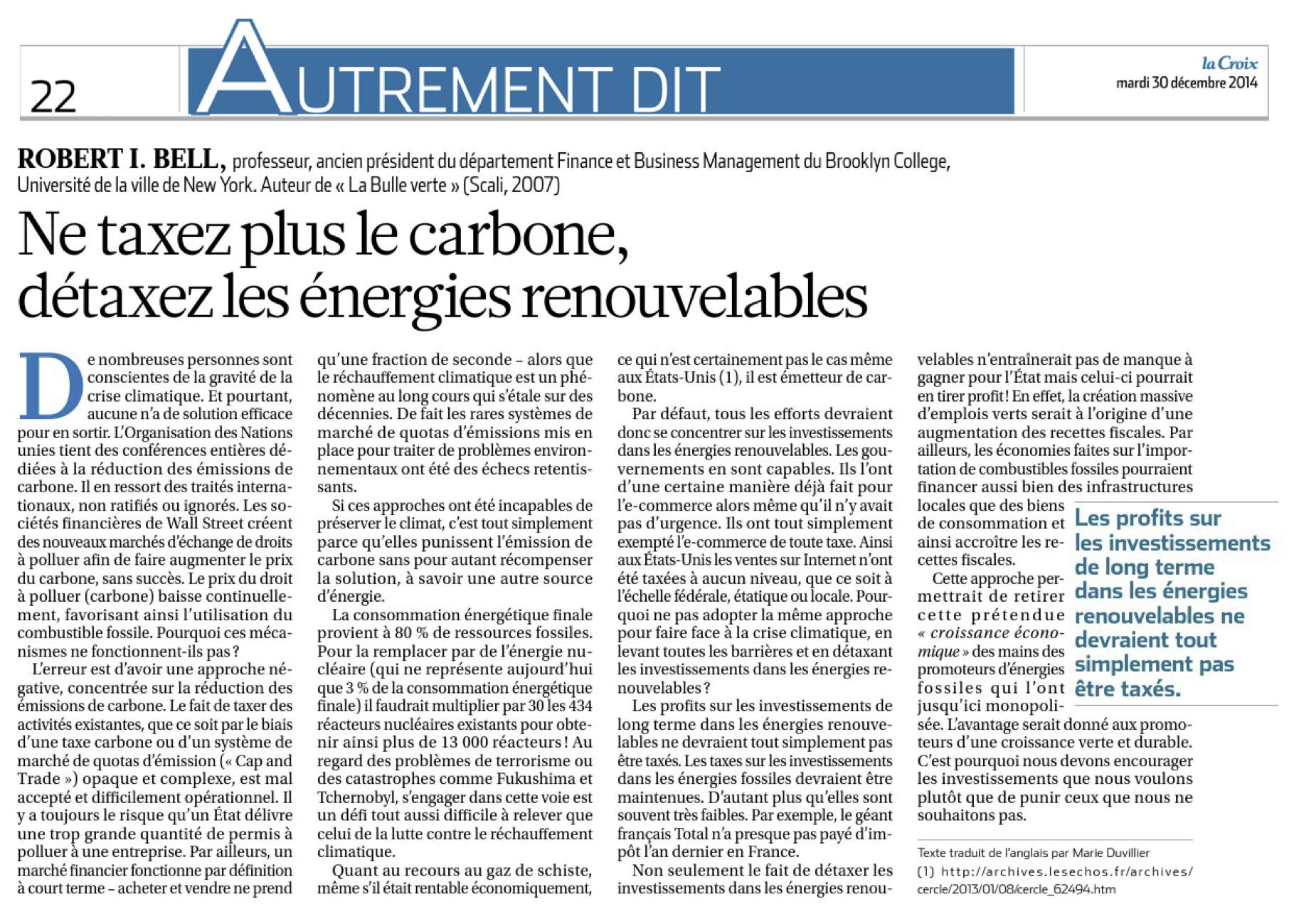De-tax Renewable Energy
© Robert I. Bell 2014
DON’T TAX CARBON, DE-TAX RENEWABLE INVESTMENT
Although millions of persons obviously are aware of the magnitude of the climate crisis, no one seems to know how to get out of it. The current public discussion focuses on reducing the consumption of carbon. Entire UN conferences are held on it; international treaties, which are then either not ratified or ignored (or both) come out of these conferences. Wall Street financial companies set up markets to trade certificates to raise the price of carbon; and they don’t work, the price of carbon keeps falling, thereby encouraging its use. Why don’t these systems work?
They focus on a negative, reducing carbon consumption, and set extremely difficult objectives from a political standpoint—taxing existing activities, by imposing a carbon tax or a complex and essentially opaque cap and trade system. Cap and trade is simply open to too many abuses—including issuing too many permits from the get-go (often giving them away). It also has a conceptual mismatch which is a killer. Trading is inherently short term, buying and selling in fractions of a second, but global warming is ponderously long term, as it settles in over decades. The few cap and trade systems to deal with global warming which have been tried have been embarrassingly ineffective. Carbon taxes, so far, have been politically impossible; no significant carbon tax exists—nearly every political leader who proposes or institutes one either backs off or gets defeated in the following election. The evidence for the failure of these approaches is clear and compelling.
Both cap and trade and carbon taxes punish what we don’t want—carbon.
These systems have failed because the emphasis has been on the problem, carbon, and not on the solution—another source of energy. Roughly 80% of final energy consumption is now produced by fossil fuel. To replace it by nuclear (currently just under 3% of final energy consumption) would require, worldwide, increasing the existing 434 reactors by a factor of 30—to some 13,000 reactors! Considering problems of terrorism, and events such as Fukushima and Chernobyl, the nuclear path clearly could be as challenging, if not more so, than global warming itself. Shale gas, even if it were economically viable, which it certainly is not, even in the U.S., still produces carbon. By default, all emphasis should be put on driving massive investment in renewable energy.
Governments know how to accomplish that sort of thing. They already did it to some degree when there was no urgency–for e-commerce. They simply made it tax free. In the US, for example, internet sales in the US have not been taxed at federal, state or local levels.
In the climate crisis, we need to let out all the stops; make all renewable investment tax free.
Profit from long term investment in renewable energy should simply not be taxed. Dividends from pure plays in renewables, if re-invested, should also be tax free, and from non-pure plays in proportion to their renewable components, as determined by the relevant tax authorities. Fossil fuel investments should continue to be taxed as they are now, which is often not very much if at all because of massive, but rarely discussed, subsidies and tax dodges. The French oil giant, Total, reportedly, paid little to no taxes in France last year.
Concerning taxes, would there be losses? It is not obvious. There might even be gains. Massive numbers of new green jobs would produce tax revenue. Add that to money not spent on imported fossil fuels, and thus perhaps spent on domestic infrastructure, or consumer goods, and we might see a tax revenue increase.
The tax free approach takes the economic growth story away from fossil fuel promoters, who have nearly monopolized it until now, and hands it over to green promoters, who can promise essentially unlimited growth of what they have to promote.
We need to reward investment in what we want, not punish investment in what we don’t want.
About Robert I. Bell
Robert I. Bell, Ph.D. is a Professor in and the former Chair of the Finance and Business Management Department, Brooklyn College, City University of New York. He was interviewed in La Croix on 14 January 2011, concerning his keynote speech at the G20 in Seoul, Korea, advocating Green Redemption Funds to save the planet from global warming: “La societe civil peut mener la bataille du climat.” He has authored several books, including La Bulle Verte (Paris 2007). In 2012 he coauthored, with Corinne Lepage, Project Volt Gas Volt for the French energy transition. He has exposed the financial problems of shale gas in the US in Les Echos and La Tribune.
